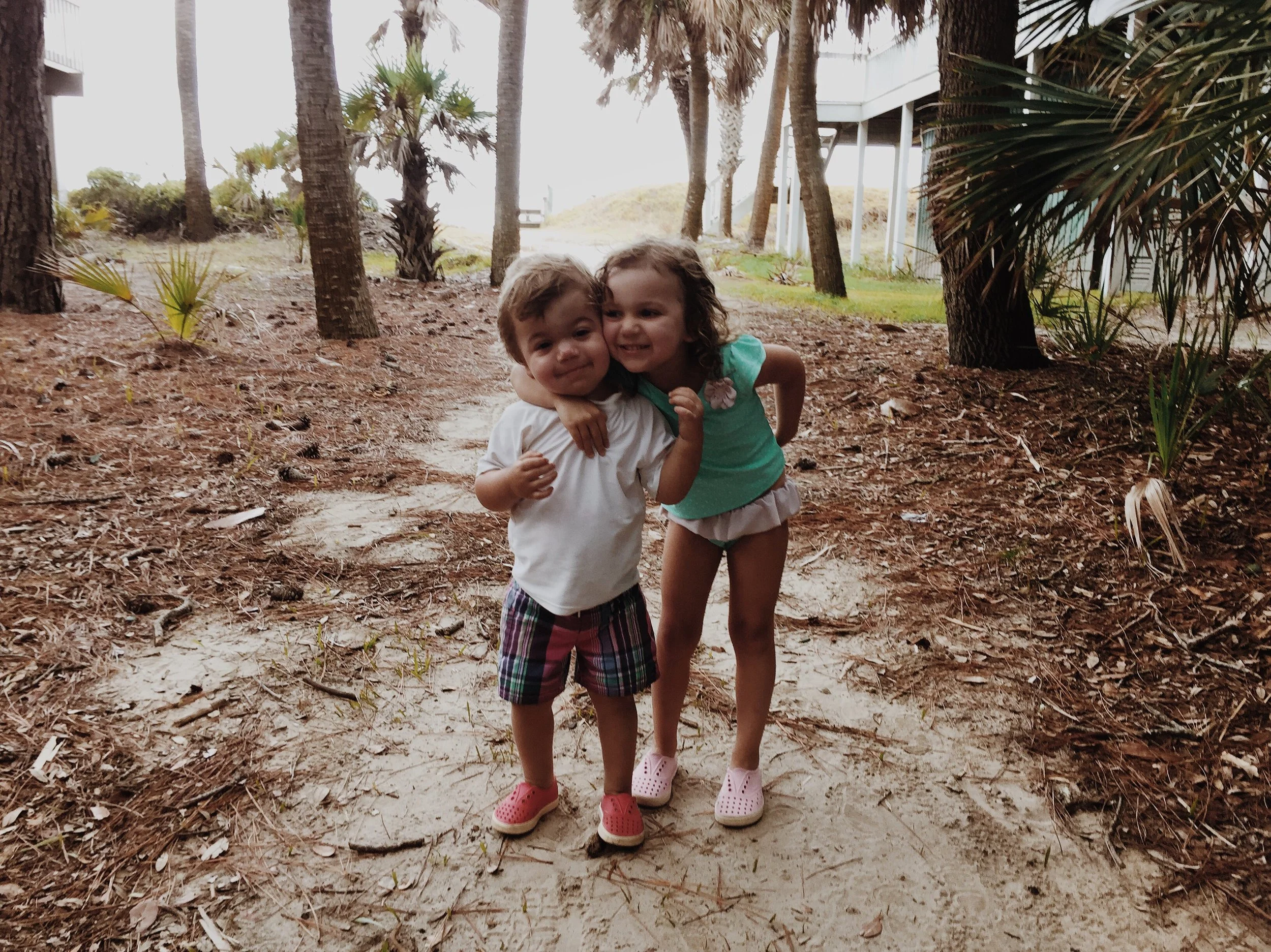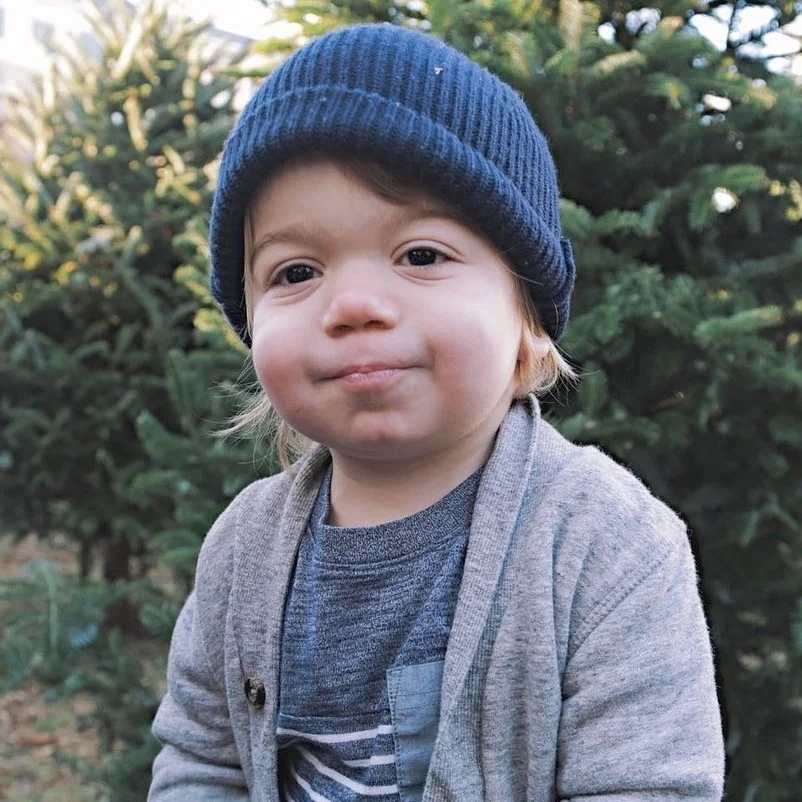Our Diagnosis Journey
The rare genetic disease had been present in his body since birth even though we did not know it yet. Our life would never be the same once we learned Hunter Syndrome was in our midst.
*By way of disclaimer, I admit it is easier for me to recount these events in a pragmatic, matter-of-fact fashion. Maybe it’s the speech pathologist in me or simply a coping mechanism. Either way, I have consciously tried to let some of the emotions seep through even though no words can do justice to the depth of sorrow, pain and dread this process brought.
Finton Richard Muedder was born on May 5, 2014, and we jokingly referred to him as our “Cinco de Mayo Babe,” and then continued to debate for way too long over the spelling of “Finn” or “Fin” after he arrived. (We eventually landed on Finn.) He was born full-term with no complications, giving us no reason to believe he was anything other than a healthy, growing infant. His height, weight and head circumference quickly reached the higher percentiles on the growth chart, which was a stark contrast to his petite older sister, but we saw no reason to think twice about it.
By 3 months of age, we realized he had torticollis (preference to look one direction), which resulted in head misshape. Despite our efforts to correct with physical therapy, he was fitted for a cranial band in October 2014. At the time, it seemed like such a hassle to clean and deal with that sweaty, stinky helmet, but - oh - what I would give to have that be the extent of our medical and therapeutic needs for him.
By 18 months old, he was walking and saying a few words. He hit milestones slightly later than most kids his age, but we wrote it off as his laid back nature and because his older sister, Avery, had also been later in hitting most milestones. Oddly, by 18 months, we noticed his soft spot had not closed, but a cranial ultrasound revealed normal results and no reason for alarm.
At Finn’s two-year-old check up, the soft spot still had not closed. Although late closures can happen in a small percentage of children, it just seemed odd. We, along with our pediatrician, wanted to make sure we weren’t missing something. During this process, our trusted doctor noticed a few coarse facial features that seemed subtly differently than the rest of the family. At first, it caught us off-guard since so many people remarked on “those Muedder cheeks” and how much he resembled Jon, and even my brother at times. As taken back as we were initially, we’ll be forever grateful for our doctor’s intuition and expertise.
A series of appointments followed. First, we met with a neurosurgeon who rather rudely made us feel silly for being concerned over the soft spot remaining unclosed. Apparently, it was not a concern from his standpoint. Happily, we could check that off the list of concerns. Next, an ophthalmology appointment revealed healthy eyes and no concern. Phew, we were good there, too! Finally, the consultation with genetics came and it was there we heard the words “MPS” first uttered. The doctor was suspicious of MPS I, Hurler Syndrome, but we would need lab work to confirm and would have to wait through the weekend for a lab appointment on Monday. We were sent home with instructions “not to google” but what would any parent do?! We googled it.
As we scrolled through the pages of information, a pit formed so deep in our stomachs we could barely breathe. So many of the symptoms seemed to line up: the emerging coarse facial features, umbilical hernia, enlarged belly (which could result from an enlarged liver as the geneticist suspected), larger tongue, broader gums and weak dentition (ironically he chipped a tooth winter 2015 that had to be pulled). As we read of possible cardiac issues, it brought to mind my mother had a brother die in childhood from a heart defect. My own heart wanted to believe it was a coincidence and nothing to worry much over. Yet somehow in the process, we learned my maternal grandmother had a brother die in childhood as well. I knew nothing about this. How was this possible, two male deaths generations apart and no one made mention of it?! Only a couple of photographs of the boys could be found, and the pit in my stomach grew deeper as I saw their broad noses, thick lips, short neck, and the overall look of someone with MPS. It conjured up a host of emotions from anger to confusion to betrayal that I may never fully unpack.
That next week we went for blood draws and urine collection. The vials were sent off. We waited. And waited. That waiting seemed unbearable. Friends and family rallied around us, fervently praying the urine analysis would be normal and the blood results would show normal enzyme activity. The most faithful prayer warriors lifted us up even though our intuitions and fears haunted us.
We should have gotten results before our family beach trip but did not. I remember packing clothes, groceries, and baby gear with the phone beside me at all times. Did I mention we also had a newborn as all this transpired? We had welcomed Mae into our family April 22, just a few weeks before Finn’s two year-old check up that served as the catalyst for this diagnosis journey.
We loaded the car with all the paraphernalia needed for a week away with a newborn, toddler, and preschooler and headed to the beach, resolved to enjoy our time away as a family. We knew these may be the last moments together before our fears were confirmed, before our sense of “normal” was gone. One afternoon while the kids were napping, I got the phone call that started, “Is your husband available to chat also?” I knew what was coming. The results, however, were somewhat inconclusive. They revealed an elevated level of GAGs in his urine, pointing to some type of mucopolysaccharidosis (MPS) but the enzyme activity for MPS I was normal. This meant the doctor was confident of an MPS diagnosis but not completely sure which one. MPS II was the next suspect. This meant more blood work was needed when we returned to Charlotte. So again, we waited. We attempted the impossible for the next few days: enjoy the time away with this incomprehensible weight on our shoulders. We drove back to Charlotte with an eerie feeling that life would never be the same again. We could never go back to the time we didn’t have this knowledge, the knowledge that MPS was in our midst, slowly taking over our son’s body.
The Waiting
Another round of blood work was drawn and sent off. We waited. But this wait was different. This wait felt a little more like a formality, yet somehow more painful than the first because any doubts of an MPS I diagnosis, any unchecked symptoms on the list, were almost all confirmed for an MPS II diagnosis as we scrolled the Internet. The puzzle pieces came together for a puzzle we did not know existed. Up to this point, we had not been searching for answers to a known problem. We had been told his umbilical hernia was fairly common, his loose stools were typical of toddler diarrhea that he would outgrow, and his chronic congestion was most likely allergies. We had not overanalyzed him chipping a tooth at 21 months; we knew of several snaggle-toothed tots. But looking at the list of symptoms, these clearly and collectively made up the pieces to the puzzle.
When we finally got a phone call several weeks later - I wish I were joking - the lab equipment had broken and it would be several more weeks before results would be processed. We waited again. We plodded along with summer plans and life with a newborn. We prayed fervently that our fears would be relieved and it was a season of testing - that this long, arduous wait was the Lord’s way of reminding us our kids are not our own. This would be an Abraham and Isaac moment, and another lamb would be provided. Oh, Lord, spare Finn this diagnosis. Our hearts would be forever changed in this process, and we would do anything you ask. We would give up anything to see our sweet boy grow up and live past his teen years.
Then the final phone call came. The bloodwork confirmed MPS II, Hunter Syndrome, a rare genetic terminal disease with no cure. The genetic counselor explained how Finn’s body was missing a particular enzyme responsible for breaking down cellular waste. The accumulation of cellular waste would lead to progressive, degenerative damage to his entire body. Most boys show regression between ages two and five years old, losing physical and cognitive abilities. The rest was a blur. There was talk of Enzyme Replacement Therapy, carrier-testing, follow-up appointments, and specialist referrals. That pit in our stomachs and weight on our shoulders grew deeper and heavier: we would never go back to “not knowing.” We would never go back to the small hope of a lamb being provided, to the hope of sparing our son this diagnosis. We would never be the same.
The diagnostic process took almost four months. This wait, filled with hope and fear, dread and acceptance, is among the most complicated seasons of my life. It may take me years to unpack the emotional and spiritual ramifications of it. There was a small relief in the diagnosis: when the wait was over, we could begin moving in a direction. We could meet with specialists, schedule surgeries, start weekly enzyme replacement therapy. There was a type of adrenaline rush that carried us through that season because it felt good to be doing after all the waiting. The fight to provide Finn the best quality of life began.
All of the scary things we dreaded like hospital trips, surgeries, and countless appointments are now our new normal. We have recalibrated to the exhaustive pace of living with a rare disease. We try to live in the now. We rejoice over new skills and new words. But we are still waiting. We wait for much worse than confirmation of diagnosis. We wait for the first skill lost. We wait for his sweet, raspy voice to disappear. We wait for his legs to fail. We wait in fear but fight for hope.




